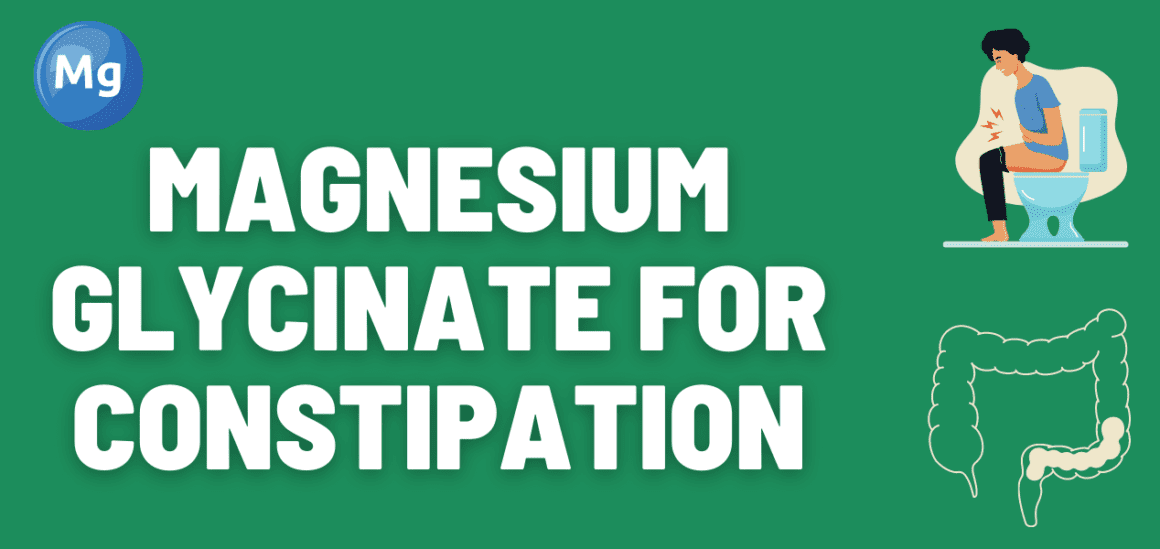One supplement used to help boost magnesium levels in the body is magnesium glycinate, which can help people who don’t get enough of it from diets or suffer from low magnesium levels. But with its benefits considered, can you take magnesium glycinate for constipation?
What Is Magnesium Glycinate?
Magnesium glycinate utilizes magnesium bound to the amino acid glycine, facilitating intestinal absorption. Integrative medicine practitioner Dr. Bindiya Gandhi says that magnesium glycinate has a higher bioavailability — making it easily absorbed by the body, and is gentle on the stomach, compared to other forms of magnesium.
→ Magnesium Glycinate Vs Citrate
Can Magnesium Glycinate Work For Constipation?
While magnesium is an essential mineral critical for muscle and nerve function, it also serves as a relaxant. Magnesium glycinate promotes bowel regularity from the inside out by nourishing the body systems that mainly facilitate bowel movement. This form is attached to glycine, a small amino acid, which allows the magnesium to be absorbed faster into the bloodstream, thus benefitting the neuromuscular system and regulating bowel function.
Glycinate is considered the best magnesium as a muscle relaxant and is more bioavailable, so it’s more effective in relieving constipation. Some forms of magnesium, however, such as sulfate and carbonate, tend to be poorly absorbed and lead to digestive problems such as diarrhea and constipation.
The Benefits Of Magnesium Glycinate
Magnesium glycinate has been shown to better exhibit the variety of benefits already attributed to regular magnesium, such as:
- Promoting better sleep – Magnesium helps promote better sleep quality and allows for a lengthier sleeping time by reducing the stress on the nervous system and relaxing the muscles, causing a steady state of relaxation and a healthy circadian rhythm, which can help people get into a more natural sleep cycle and wake up feeling refreshed. But one study found that taking magnesium glycinate greatly improved insomnia symptoms better.
- Supporting and enhancing cognition – Research has shown magnesium glycinate can help lessen daytime sleepiness and enhance memory. One study found that the daily consumption of 125-300 mg of magnesium glycinate helped with short-term memory and IQ.
- Supporting blood sugar control – Research has shown that dietary magnesium intake appears to help manage blood sugar levels among people with diabetes. It works by reducing the risk of developing type 2 diabetes because magnesium helps break down sugar, decreasing insulin resistance.
- Relieving migraines and headaches – Low magnesium levels in the blood have been linked to migraine headaches. Studies on magnesium have found it to be a potentially well-tolerated, safe, and inexpensive option for migraine and headache prevention and even potentially effective as a treatment option for tension-type and cluster headaches.
- Promoting bone health – Like calcium, magnesium is also crucial in bone formation and influences parathyroid hormone and vitamin D concentrations, which are also involved in bone formation. It also contributes to increased bone density and helps prevent the early signs of osteoporosis.
- Promoting healthy blood pressure – Taking magnesium benefits blood pressure in those who have low magnesium levels. One study found that magnesium may help reduce blood pressure by increasing the production of nitric oxide — which helps relax blood vessels.
- Helping manage PMS symptoms – Magnesium glycinate supplementation can greatly alleviate premenstrual symptoms (PMS) such as depression, anxiety, insomnia, water retention, and breast tenderness. A 2010 study found that magnesium, along with vitamin B-6, helped significantly in reducing PMS symptoms.
- Promoting heart health – Low magnesium levels can result in or worsen arrhythmia (irregular heartbeat), which may increase the risk of a stroke or heart failure. Magnesium is central to a healthy heart rhythm because it involves transporting other electrolytes, such as calcium and potassium, into cells. It’s also instrumental for properly maintaining cell membrane potential and the body’s antioxidative pathways.
How To Take Magnesium Glycinate
Take this medication regularly to get the most benefit from it. Remember to take it on the same schedule each day. Follow all directions on the product package. It is best to take magnesium supplements with a meal to reduce stomach upset and diarrhea unless otherwise directed by the product instructions or your doctor.
For tablets:
If you’re taking the tablet form, take each dose with a full glass (8 oz or 240 milliliters) of water unless your doctor directs you otherwise. Swallow extended-release capsules and delayed-release/enteric-coated tablets or capsules whole. For chewable tablets, chew each tablet thoroughly before swallowing.
For extended-release capsules:
If you’re taking extended-release/delayed-release/enteric-coated capsules, swallow them without crushing or chewing. Avoid crushing or chewing them since doing so can release all the drugs at once and could increase the risk of side effects. Also, avoid split extended-release tablets unless they have a score line or if your doctor or pharmacist allows you to do so.
For syrup and suspension form:
When using a liquid product, use a medication measuring device to carefully measure the dose. (If you don’t have one, ask for it from your local pharmacy) instead of an ordinary spoon because it may not get you an accurate dose. If you have the suspension form, shake the bottle properly before each dose.
Dosage Rules
The following are the standard recommended dosages imposed by the NIH on oral magnesium supplements:
- 65 mg for children 1-3 years
- 110 mg for children 4-8 years
- 350 mg for anyone over 8 years old
The dosage amount is based on your medical condition and response to treatment. Don’t increase your dose or take it more often than recommended on the product package or as prescribed by your doctor since high doses of magnesium from supplements or medications can cause certain side effects. In addition, they may interact with certain types of antibiotics and various medications.
Side Effects
Excessive intake of magnesium often leads to certain health problems. Some common side effects include:
- Facial flushing
- Nausea
- Vomiting
- Abdominal cramping
- Diarrhea
More serious side effects also occur in some severe cases:
- Confusion
- Low blood pressure
- Breathing problems
- Irregular heartbeats
- Muscle weakness
- Cardiac arrest
- Coma
- Death
If you experience any of these side effects, seek immediate medical care.
Takeaway
Getting constipated can get you stuck in an uncomfortable situation (No pun intended) and is a condition that can affect almost everyone. Magnesium glycinate, a natural mineral in the diet, is an underrated remedy that can help relieve it effectively. It supports bowel regularity from the inside out by nourishing the digestive system and promoting healthy bowel function!
If you have any questions, consult your doctor or pharmacist, or if you think you may have a serious medical problem, get medical help immediately. Tell your doctor if you have any lingering symptoms of low magnesium blood levels, such as muscle cramps, tiredness, irritability, and depression.










